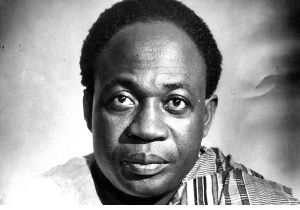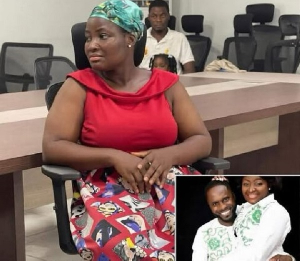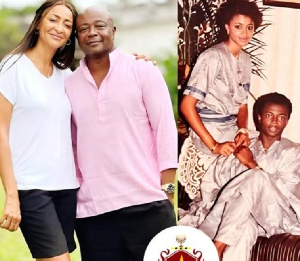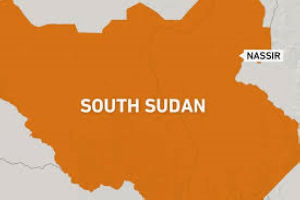Kwame Nkrumah was born on 21st September, 1909 in a typical Gold Coast village, unknowing to his goldsmith father that the little boy was going to be both a national and international figure with his name resonating across the globe even after he returned to his maker.
There could not have been a more opportune day to remember a great figure like Osagyefo Dr. Kwame Nkrumah than on his birthday. He was a man busy from his cradle until he retired to eternity. The motley of activities on the public space both locally and internationally in which he was knee-deep some of them showing him as the leading figure offer us so much to write about him in commemoration.
For someone who accomplished so much, the dearth of space is always a challenge when confronted with the task of composing his story. Not all areas can be covered suffice to point out that whatever is chosen for such a feat would make interesting reading.
That part of the Gold Coast where he was born was the Western Province and as destiny would have it, he grew up to play an important political role not only in his country but on the global space.
Imprint
The independence which was attained eventually on 6th March 1957 had his imprint. It was a feat with which showed all the hallmarks of destiny and like all big feats did not come on a silver platter.
At first he was Leader of Government Business, then Prime Minister in 1952 and eventually President, a position he held until he was ousted on 24th February, 1966. His story is intertwined with the history of Ghana.
Having been abroad for twelve years studying for higher academic laurels, those close to him might have discovered that the man Kwame Nkrumah was a chosen man whose activities would chart a new path for his country.
Destiny Beckons<>:
While abroad the politics in his bloodstream saw him dealing with diasporic pan-Africanists. As destiny would have it, his senior colleagues at home who were already engaged with the foundation of a struggle for an eventual self-government had taken notice of him. One of such personalities mentioned the name of Kwame Nkrumah who fitted the bill for somebody with a passion for the struggle to serve as secretary. When destiny is calling, there cannot be resistance. Kwame Nkrumah heeded the invitation and returned home.
The Genesis:
His political career had begun in earnest as he was soon embroiled in the struggle for independence, his passion seemingly overwhelming that of his seniors who invited him to come home. The differences between him and those who invited him to come and join in the struggle led to his departure from the United Gold Coast Convention (UGCC) to form his Convention People’s Party (CPP).
He wanted ‘Self-Government Now!’ unlike the UGCC’s ‘Self-Government’ in the shortest possible time.
The speed with which he handled his passion led to occasional clashes with the colonial authorities and incarceration.
Ideology:
His socialist ideology was not visible in the early days of the struggle. This was soon to show in the post-independence days. This was represented by his growing ties with the powerful socialist and communist countries in the East.
He was to set up a Kwame Nkrumah Ideological Institute in Winneba, the first of its kind in West Africa if not the whole of Africa. Here students were taught political science with an inclination to socialism.
Past students of the institute many of them in their mid-70s still trumpet the ideals of the late Osagyefo Kwame Nkrumah, the Osagyefo being an appellative title for chiefs among the Akans of Ghana.
It was unsurprising that we had in the country persons referred to as Nkrumaists, some of them relishing such coinage as Maoist-Leninist-Nkrumaist thought.
During his reign, socialism was noticeable in education, agriculture and almost every area of human endeavour.
The state farms concept was a replica of what existed in places like China. In the early 60s there was a major Chinese exhibition programme which pointed at the growing ties between Kwame Nkrumah and the leader of the Communist Party of China, Mao Ding Dong.
Culture Blend:
Kwame Nkrumah’s dressing soon changed to the Chinese style of collar-less suit, a departure which was another indication of how much he was leaning to the East.
The many ambitious projects portrayed him as a person eager to launch the country into a modern industrial age as seen in the many state companies such as factories for fruit juices, pharmaceuticals, footwears and others.
Unfortunately when he was overthrown, the companies were ignored, starved of support and soon wild grass and shrubs took over some of them.
Some of the companies were privatized. Other fell into the hands of charismatic churches.
Capitalist World:
The capitalist world as represented by the US did not savour the growing communist influence on Ghana. Besides China, Ghana under Kwame Nkrumah had good links with Russia and East Germany, both countries offering scholarships to Ghanaian students to go and study especially medicine in their countries.
Strong speculations pointed at the putsch of 24th February 1966 as engineered by the Central Intelligence Agency (CIA) of the US.
Baba Tudu:
As a growing child in Tudu, Accra, there was a venerable old man called Baba Tudu one of the very old persons in the Accra suburb at the time.
Kwame Nkrumah used to visit the old man and to date when I remember our parents recalling those times I wonder what Ghana’s first President, one of the country’s founders, could be discussing with Baba Tudu.
All I can think of is that they were discussing politics and about the thought of why the white man must go back to his country and allow black men to take the destiny of their country into their hands.
Controversies:
So many years after his ouster and death, his name continues to be a subject of various shades of opinions. While some want to point at his achievements with relish, others however regard his feats with a pinch of salt.
He did so much. Some would admit, yet they would nonetheless query his record for the human rights abuses and undemocratic traits he exhibited during his public office life.
Well that is life, especially in leadership. Here is a man who was in a hurry to move his country out of the state of under-development to prosperity.
Political Kingdom:
Kwame Nkrumah was a master of oration. Some of his thoughts have so far stood the test of time and often referred to for the embellishment of especially political compositions.
One of his arguably the most outstanding was the one he uttered on Sunday, Dec 12, 1948. It was a rendition of his dream of a West African unity. Although his ultimate dream on an African Unity about which he spent so much energy and resources to achieve it can be said, the Economic Community of West African States (ECOWAS) has its seed in Nkrumah’s.
“And across the parapet, I see the Mother of West African Unity and Independence, her body smeared with the blood of her sons and daughters in the struggle to set her free from the shackles of imperialism. And I hear and see springing up cities of Ghana and becoming the metropolis of science, art, industry, scientific agriculture, philosophy and learning. And I hear mortals resound and echo with the rejoinder: Seek ye first the political kingdom and all things will be added unto it.”
Kwame Nkrumah was so captivating when he mounted the rostrum to pour out his hearts and he did so with such vim there was no doubt in the minds of his audience about this great African who thought about his continent and breathed it.
No wonder Ghana as soon as he became her leader became a Mecca for Africa liberation fighters. They trooped to Accra to savour the hospitability he reserved for them.
Kwame Nkrumah soon became an international icon partaking in major deliberations such as in the non-aligned movement.
Indeed it was one of such travels to Hanoi for an international deliberation when the 24th February, 1966 coup occurred.
Workers’ Brigade, Young Pioneers:
Kwame Nkrumah’s introduction of the Workers’ Brigade and Young Pioneer Movement, concepts he brought from the Socialist world at the time of strong ideology in China and Russia, instilled a sense of patriotism. So many years after his demise there have not been a rival to the concepts in terms of instilling the spirit of patriotism.
Writing about his boss in a book ‘By Nkrumah’s Side’ Tawiah Adamafio stated that “During the President’s visit to Eastern Europe, one of the most impressive lessons we learnt was his organization of the youth. Everywhere we went, particularly in the Soviet Union, it was very much in evidence. The Youth were so organized that at every function attended by us they were present either as guards or servers.
Dr. Kwame Nkrumah was quick to notice the usefulness of this organization and when we returned home he wasted no time in setting up the Young Pioneer Movement in an attempt to organize and mobilize the boys and girls of Ghana into a monolithic organization planned to discipline the Youth and prepare them for future leadership.”
The Workers’ Brigade was a response to the growing need for employment opportunities for a country of some 6 million in the 60s.
Workers Brigade was a paramilitary body but whose mandate was in the construction and agriculture spheres of life in the country. They were part of the country’s labour architecture, their trademark olive green uniform and a beret of a similar colour to march. They undertook unarmed drill but there was talk of eventually having them do weapon training. At the peak of his reign there was a lot of propaganda flying about in the country most of them propelled by his opponents.
Sports Enthusiasts:
Kwame Nkrumah loved sports and expended time and resources to promote it. We think that he saw in sports an opportunity to instill in the youth the spirit of competition and discipline and above all the projection of the Ghanaian in the international arena. He was a man passionate too about the image of not only the country but the African in the comity of nations, something which found space in one of his famous quotations.
Ghana’s soccer history has a chapter on the formation of the Republicans which some prefer calling Kwame Nkrumah’s own team. It was not the national team, the Black Stars, existing side by side it.
Its formation earned for Kwame Nkrumah some disenchantment among the soccer loving fans in the country. The picking of two footballers from the existing teams to form the Republicans infuriated these soccer lovers. They thought it was unfair to deal such a blow to the teams.
The Kumasi Asante Kotoko, Accra Hearts of Oak, Great Olympics, Accra Standfast and others lost two players each to the Republicans.
It would appear that being the President’s team the players enjoyed special facilities not available to others.
Baba Yara, Ghana’s most celebrated goalkeeper was picked from Asante Kotoko by the President for his own team, the Republicans.
Important soccer duels were organized at the instance of the President, another evidence of his love for this popular sporting activity.
The President’s Cup, an important date on the horseracing calendar in the country was highly favoured by Kwame Nkrumah. His appearance during this duel of the horses and jockeys attracted so many horseracing enthusiasts to the location now housing the Kempinski Hotel in Accra.
Kanda Estates
The buildings in Kanda Estates used to be occupied by persons associated to the President especially Security Officers. Indeed the National Security Coordinator whose designation might not be the same lived in this part of town. The area was acquired by the government for the construction of the houses. It used to be a beautiful part of the town and like the Kwame Nkrumah Estates at Laterbiokorshie, constituted the President’s dream of shelter for all Ghanaians.
Newtown Residence:
When Kwame Nkrumah landed in Accra from his sojourn abroad a place was acquired for him in Accra Newtown, formally Lagostown.
The house still stands in this part of town but we can bet many hardly know this history. In some countries the house would have been raised to the status of a political shrine. We are not gunning for that though but would rather it is listed as a national heritage with some allowance paid to the owners of the property.
Statue
The bronze statue of Kwame Nkrumah used to be part of Accra’s skyline. Standing in front of the old Parliament Building in Accra it was one of the place attacked as soon as it became apparent that a coup had occurred and that Kwame Nkrumah was no more the President.
Nobody stopped the many excited Ghanaians who trooped to the place to pull down the statue. Many succeeded in cutting pieces of the statue but not enough to eradicate it completely. What remained of it was eventually moved to the Accra Museum where for many years it was lying down within the premises of the place.
Remembering Him
Having hated the man towards the end of his political career, it is amazing that today some regard him as the best Ghanaian to be president although an equal number despise him, blaming him for using much of the country’s funds to sponsor the liberation struggle in southern Africa and to project himself.
That’s his history anyway, a controversial subject presented according to the idiosyncrasies of the writer.
Nyaniba Estate:
The part of Osu in Accra called Nyaniba Estates is another layout of houses bearing similar architectural design constructed under the President’s Housing Project.
His mother Nyaniba lived there and so earned for the location the name Nyaniba Estate. What a befitting honour for a woman who mothered the man who led the charge for Ghana’s independence from the British.
Education Trust:
Kwame Nkrumah wanted an accelerated educational development of the country, seeing in it as the only way to enhance the human capital of the newly independent Ghana.
The educational trust campaign he launched was intended to enhance this programme. Today, many years having his exit from this ephemeral world Ghana Senior High School, formerly Ghana College and then Ghana Secondary School and its counterparts in Accra’s Accra Girls Senior High Scool, Ghana National College now Ghana National Senior High School among others scattered across the country bearing similar architectural design are living testimonies to his achievements in the educational sector.
The continuation of the colonial period’s free education in the Northern Regions by Kwame Nkrumah enabled so many children from the economically deprived of the country to acquire education.
Infrastructural Development:
The Accra-Tema Motorway, another evidence about the President’s passion for physical development still stands, even further enhancement to it is being undertaken.
Trunks roads, feeder roads were constructed across the country in the early post-independence period.
The seven-year development project which was given much publicity sought to catapult the country into a new sphere. It was hardly understood by most Ghanaians.
The Akosombo Hydro Electric Dam is a testimony that Kwmae Nkrumah meant serious business.
Fathia Nkrumah:
A certain Major Sinare, a Ghanaian who studied in Egypt and made a lot of contacts in the North African country and later became a pioneer Imam in the Ghana Armed Forces played a pivotal role in arranging the meeting and eventual marriage between Fathia and Kwame Nkrumah.
He reportedly had other children before this new union which was also blessed with children, important personalities today some of them in Ghana and outside the country’s borders.
Transport:
The Black Star Line, the state shipping line bought some ships to augment the fleet vessels which were given names to reflect the Ghanaian independence.
New coaches were bought for the Ghana Railway Corporation as was done for the Government Transport Department which later became State Transport Corporation whose Setra buses from Germany became features of long distance travel across the country.
Deportations:
In 1958 a little over a year after independence Kwame Nkrumah was perhaps overwhelmed by opposition to his rule. He resorted to measures like enacting laws to deal with such issues which he deemed to be of security importance.
The Preventive Detention Act (PDA) which empowered him to have suspects imprisoned for indefinite periods was to see many persons imprisoned.
Those who supported the Osagyefo, defended him by saying that he could not have survived the machinations of his adversaries had he not resorted to this legislation. For others however, it was draconian and prepared the country for an eventual One-Party State which it was at the time of the coup which toppled him.
The deportation act which saw the deportation in 1958 of Amadu Baba, a rich Hausa businessman in Kumasi to Kano and another Muslim, was not taken kindly by his opponents.
Amadu Baba was born in Ejisu and for the President to have him deported to Nigeria was rather harsh, his adversaries said.
A British lawyer who had landed at the Accra airport to adjudicate in the case was sent back to London on the next flight. ‘Sucros In Sucros Out’ (Showcross) was the headline in a state newspaper for the story about the action.
Another person who was deported was the news editor of the Daily Graphic Bankole Williams.
Literary Prowess:
Kwame Nkrumah’s literary works stand him apart from his contemporaries many of who did not put their journeys into writing. His work ‘Consciencism’ was one of the many books he authored. Others were written about him and from these many things can be gleaned from this political giant who exited the political scene at a time he least expected. That is life giants hardly complete their works before they are called to their maker.
Tawiah Adamafio:
In his book ‘By Nkrumah’s Side’ Tawiah Adamafio one of his associates writes about Nkrumah in his preface “the story of Ghana Convention People’s Party which ruled the country for fifteen years and of Kwame Nkrumah, its head, has been told in various ways by several persons.”
Kulungungu:
This town near Bawku was where Kwame Nkrumah survived an attempt on his life a grenade having been put in a bouquet of flowers presented to him as a mark of honour.
Kwame Nkrumah and Maurice Yameogo of the then Upper Volta (now Burkina Faso) were scheduled to meet in August 1962 at Tenkudgu (Tenkurugu) a small frontier town a few miles from Bawku to finalise some agreements regarding the use of Ghana’s port.
Adamafio was part of the trip which was eventful on the return journey. Tawiah Adamafio did not allow a requested permission for Kwame Nkrumah to stop and be honoured by school children when they were heading for the rendezvous. On the return trip a school head teacher who had earlier sought to have the President honoured tried again through somebody with authority and as Adamafio said succeeded in having the motorcade stop.
It was in the process of presenting the bouquet that a grenade went off killing the little boys doing the presentation. He survived it having been rushed to Bawku hospital then to Tamale and eventually Accra.
Transition:
He traveled a long journey, the last few milestones being the 24th February 1966 coup when he was away in Hanoi then sojourning with his friend Sekou Toure and eventually ending up in Romania where he died on April 27, 1972, his assignment on earth having come to an end.
His death expectedly evoked mixed reactions. Whatever the reactions were here was a man who took part in the achievement of independence of his country in fact leading the charge. Being human he trampled upon the feet of as many persons as those his policies helped to live comfortable lives.
Opinions of Saturday, 21 September 2019
Columnist: A.R. Gomda















